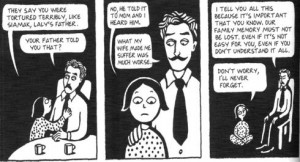Hello fellow ASTU classmates,
Today, during our lecture about Persepolis, we touched on the subject of “never forgetting”. This is quite an important theme in this Graphic Novel, since it is repeated multiple times, by the people that are most important to Marji, the main character. This theme is also discussed by the literature scholar Hillary Chute in her essay, where she argues that “Persepolis not only does not forget, but also, more significant, shows us the process of “never forgetting” through its layers of verbal and visual narration” (Chute p.97 “The Texture of Retracing in Marjane Satrapi’s Persepolis).
The two main events where we encounter this theme is when her dear uncle, Anoosh, tells her that the story of her family might be hard to understand, but it should never be forgotten.
Another example that had the most impact on me, and which I am able to relate better with is when Marji’s grandmother tells her to “be true to herself” and to never forget where she is coming from, before Marji’s departure to Austria.
This latter example relates to what I experienced two years ago when, for the first time, I found myself alone for a year, in a country that was not mine, trying to speak a language extremely different from my own and trying my best to adapt to a new culture. Right before my departure, my own grandmother gave me similar advice and just like Marji, I did not quite understand the deeper meaning of those words at first. I simply assumed it would have been easy to do so, just as Marji thought.
When I arrived in the United States, I immediately experienced a culture shock. I was having difficulties in understanding the people around me, knowing when I was supposed to speak, when I was not required to and, more significantly, I could not express myself, therefore I could not be my true self. I wanted to connect this, with a laboratory that I attended during Jump Start, where the speaker talked about how we are more likely to be defined as shy when we cannot speak the language correctly, although when we are speaking our own language we are not as timid. When I was listening to the speaker I could see how the explanation related to my first experience abroad, since the people that I was with, have always seen me as shy, always proper and closed, but these adjectives do not represent the entire truth about myself. During that time spent in the United States, I found myself trying my best to conform to the ideals that people had of me, just like Marji tried to be accepted by the new society where she moved to.
These societal norms put too much emphasis on how we should look, act and behave in order to be accepted by our peers. These have the tendency to make us forget who we really are, our true selves. This do not happens exclusively when you go abroad but also within your own community and society. We are always pushed to fit in determined boxes that society created for us in order to be accepted by the people surrounding us, therefore we have to follow specific rules that do not allow us to “be our true selves”.

